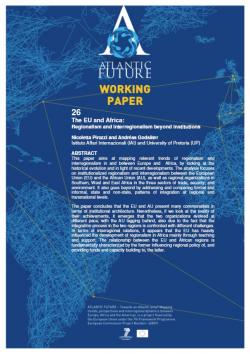The EU and Africa: Regionalism and Interregionalism beyond Institutions
This paper aims at mapping relevant trends of regionalism and interregionalism in and between Europe and Africa, by looking at the historical evolution and in light of recent developments. The analysis focuses on institutionalized regionalism and interregionalism between the European Union (EU) and the African Union (AU), as well as regional organizations in Southern, West and East Africa in the three sectors of trade; security; and environment. It also goes beyond by addressing and comparing formal and informal, state and non-state, patterns of integration at regional and transnational levels. The paper concludes that the EU and AU present many commonalties in terms of institutional architecture. Nevertheless, if we look at the reality of their achievements, it emerges that the two organizations evolved at different pace, with the AU lagging behind, also due to the fact that the integration process in the two regions is confronted with different challenges. In terms of interregional relations, it appears that the EU has heavily influenced the development of regionalism in Africa mainly through teaching and support. The relationship between the EU and African regions is fundamentally characterized by the former influencing regional policy of, and providing funds and capacity building to, the latter.
Paper produced within the framework of the Atlantic Future project, November 2015. Publ. in Frank Mattheis and Andréas Litsegård (eds.), Interregionalism across the Atlantic Space, Cham, Springer, 2017 (c2018), p. 75-93 (United Nations University Series on Regionalism ; 15), ISBN 978-3-319-62907-0; 978-3-319-62908-7 (ebk); DOI 10.1007/978-3-319-62908-7.
-
Details
Barcelona, Barcelona Centre for International Affairs (CIDOB), November 2015, 26 p. (Atlantic Future Working Papers ; 26)
1. Introduction
2. Conceptualizing Regionalism in Europe and Africa
3. Origins and evolution of regionalism in Europe and Africa
4. Outcome of regionalism in Europe and Africa: trade, security and environment
4.1 Trade
4.1.1. Regional trade integration in Europe
4.1.2. Regional trade integration in Africa
4.1.3. Regional trade integration in Southern-, East- and West Africa
4.2 Security
4.2.1 Regional security integration in Europe
4.2.2. Regional security integration in Africa
4.2.3. Regional security integration in West Africa
4.3. Environment
4.3.1. Regional environment integration in Europe
4.3.2. Regional environment integration in Africa
4.3.3. Regional environment integration in East Africa
5. Comparing regionalism in Europe and Africa
6. Interregionalism between Europe and Africa
6.1 Pure interregionalism
6.2. Transregionalism
6.3. Quasi interregionalism
7. Assessing EU-Africa interregionalism: a partnership among equals?
References



